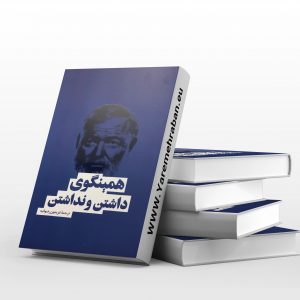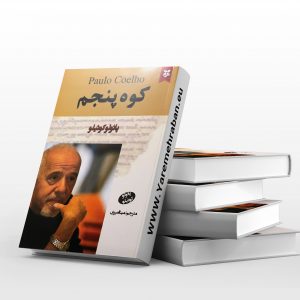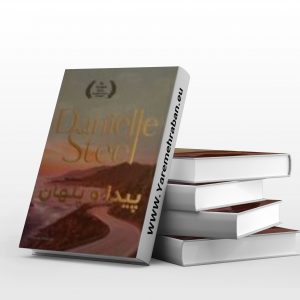Description
Kiss the lovely Face of God is the name of Mustafa Mastoor’s first and most popular novel.
The novel deals with a philosophical and ontological subject and seeks to answer the questions that always arise in the conflict between reason and emotion.
In this novel, the author expresses his thoughts, religion, epistemology, sociology, etc. in the language of the characters of the story, which is based on three basic axes: doubt, uncertainty, loneliness. Doubt like what should not be ignored,
The main concern of the author, that is, God-centeredness and the thought and thought of faith and holiness and man’s attempt to discover himself and discover the meaning and God, is in the story, which must have an extraordinary value. This novel is, in fact, one of those stories that brings back and regulates the painful soul of a self-alien human being.
This book was first published in 2000 by Markaz Publishing. Kiss God on the Moon by Mustafa Mastoor has been reprinted many times.
The story of this book is defined based on philosophical principles and the author has tried to express his religious thoughts, epistemology, sociology and از thoughts in the language of the characters of the story.
Kiss God on the Moon The author raises many questions that may arise for many people. In essence, the theme of the novel “Kiss God” is of the doctrinal type and is based on doubt and argument, which is one of the intellectual concerns of modern man today and the struggle with the absence of God.
Mustafa Mastoor is a popular author and has many fans among readers. The book Kiss God on the Moon is one of the best-selling contemporary novels. Most of his books are short story collections. Mastoor also wrote the play.
Mustafa Mastoor is also fluent in English and has several translations in his repertoire. Several collections of short stories and a book about his beloved director Kieslowski are among the titles he has translated. Mastoor sometimes writes poetry and a collection of poems has been published by him.
Awards given to Mustafa Mastoor:
Selected the best novel of the 79th and 80th years of the Golden Pen Festival for the novel Kiss on the Moon of God
Selected the best novel of 2003 Isfahan Literary Award for the novel Pig Bone and Leprosy
the winner? Certificate of appreciation from the first story writing competition of Sadegh Hedayat
In the long story on the moon, Mustafa Mastoor kisses God in order to psychoanalyze people who have completely forgotten the element of morality by using some social relations. The author’s painful look, which manifests itself in the form of an active figure in social research, is largely fruitful; Because Mastoor has discovered the motivation of his narration beautifully and has reached a relative reconciliation with his reader.
Kiss God on the Moon is considered by many activists in the field of fiction to be the most successful work to date. A work that was able to attract both the general audience and the specific audience.
Social concerns and what goes on in the general structure of urban life are the main mentality of this author, a mentality that is evident in most of his works.
Although Mastoor has not yet been able to free himself from the dominance of the dimensions and successes of the work in question, and traces of its overall structure can be seen in his other works, his insistence on projecting a human subject is commendable.
The hidden works in the divisions related to the field of fiction literature side with urban stories and the main events that take place in the world of his writing are related to urban elements.
The type of urban literature that is the result of modern human life is very popular in the world today and the emergence of writers in this type of literature is one of the common debates in academic and free circles today.
Mustafa Mastoor, who can be considered as one of the active writers of urban literature, has mentioned the sufferings of human beings trapped in iron and concrete chambers in several works from different angles, and this view has reached its peak in the long story of kissing the moon of God. Is.
Kiss God on the Moon is a remarkable work because Mastoor has been able to create characters who act completely independently without any slogans and one-sided judgments, and no trace of the author’s mind can be found in them. ; An issue that has not been observed in works such as pig bones and leprous hands.
The remarkable point in a work such as Kiss God on the Moon is that the author has freed himself from the shackles of belonging and has experienced a different kind of gaze and life. It can be said that the characters of this work are completely settled in the existence of the author and live in his soul and in a more technical expression, have accepted each other and, accordingly, create a sense of belief in the reader. .
One of the most important points in the field of storytelling is the discovery of the gaze, that is, the author’s gaze in the face of a subject that others may not be able to see, distinguishes him from ordinary people, and in other words, how he sees Also teaches and how to see side by side the work is often available.
Mastoor has not gone far in the overall construction of his work, but has expanded his horizons and tried to recreate his surroundings. What happens in the general process of this work is of the kind of events and happenings that every person caught in urban life inevitably struggles with, without being able to have an analysis of events.
The main reason for the exemplary luck of kissing the moon of God among the general public seems to be rooted in this impartial analysis of small and large social issues; The point is as if he has written all the events in bold and brought them closer to the eyes of the audience. The construction of a story on the moon Kiss God is a construction in which the reader feels that another person is speaking in his place. That is, Mastoor raises a public concern, a concern that everyone likes to talk about and write about if they can.
The main narrator and protagonist of the story, Younes, as a PhD student in sociology and a researcher in social affairs, is first and foremost a citizen. A citizen whose only difference from others is the kind of outlook mentioned earlier.
Younes is by no means an unattainable character. He does not expect to bring the lower level of society with him, but tries to bring himself closer to this level in various ways and to reach a distance less than the depth of the catastrophes.
The hidden mentality and the character of the story become so close in different parts of the work that the reader feels that Younes is hidden and Younes himself is hidden. The author’s simplification and the protagonist’s simplicity find an exemplary connection throughout the work, so that the audience feels like a kind storyteller is telling them a story.
Another point that Mastoor has done well in this work is respect for the consciousness of the reader who avoids the book. By addressing small and large social issues, he has not only traveled to the lower layers with his character, but also seeks to prove the true claim that the problem of not reading books is also rooted in these small and large problems.
Kiss on the Moon is one of the works that was initially silenced in the press and literary circles, but this ruthlessness never managed to destroy its wide dimensions and human values, and numerous editions of this work showed that the author in addition to Targeting an epidemic has reconciled many aliens with the book, at least to the extent of reading the same work.
Just as Younes does not seek to weave philosophy in the process of his painful social research, Mastoor has said as much as he should to establish understanding between the reader and the book; Neither more nor less.
Creating a clean atmosphere in the overall development of the story and showing the ugliness of society in a believable way and away from any moral malpractice, is another point that should be mentioned. Creating spaces that, if combined with a bit of laziness in writing, will have nothing but the opposite result, are beautifully created in this work, which shows the author’s mastery of the elements used in the work.
In any case, Mustafa Mastoor was able to kiss God with a long story on the moon, to prove himself among the general public as a sensitive writer, and I wish he could test his power and dominance from another angle.
The success of a work is always accompanied by the risk that it may affect all the works of that author and the rest of his writings will have the same color and smell; This point, unfortunately, is also evident in the next hidden works.
In any case, this author is now one of our motivated and hard-working writers. An author that every lover of literature considers his destiny as his own destiny and will undoubtedly be happy with his successes.
Doubt of the existence of God sits in the heart of every human being. Many mystics believe that it is doubt that causes the stages of mystical and spiritual growth in human life, a growth that can not be considered a stopping point. Mustafa Mastoor illustrates this concern well in the story Kiss the Moon by describing the layers of the main character of his story.
Kiss God on the moon; The turning point in the life of a hidden profession
The book Kiss God on the Moon is by far the most glorious work of Mustafa Mastoor and a turning point in his career. The use of subtle and fluent language in expressing deep concepts such as doubt in the existence of God and precise characterizations caused this book to have many fans among specific and general audiences and it quickly reached the second and third editions. Kiss the Moon on the Moon won the award for the best novel of the “Golden Pen” festival in 1379 and 1380 and raised the expectations of critics from the next works.
Among Iranian writers, we rarely find anyone who writes his stories in philosophical contexts and kisses God on the moon. In this sense, it is a book that can be studied and, of course, praised. The hidden point of view in this novel is internal and the so-called narrator is the same as the protagonist.
Synopsis Kiss the Moon of God
Younes Ferdows is a PhD student in sociology and has chosen the topic of his dissertation to study the reason for the suicide of Dr. Mohsen Parsa, a prominent contemporary physicist. Younes’s fiancée is a shadowy student of theology, and he is trying to prepare his dissertation on the subject of God’s conversation with Moses. A few years ago, when Younes was studying philosophy, he had a classmate named Mehrdad, who fell in love with an American girl named Julia through his correspondence, and later left for this country.
The story begins with Mehrdad coming to Iran after many years away, and Younes goes to the airport to greet him by buying a few orchid flowers. In this story, Mastoor shows that doubt in all matters leads man to a hell that each person builds for himself and those around him with his own hands. Doubt that can penetrate all aspects of a person’s daily life and divert him from the main path of his life and lead him to loneliness and solitude.
Kiss on the moon translation of God; From Saudi Arabia to Albania
The book “Kiss God on the Moon” was published in 2015 in the Arab world under the title “Vajjatullah” by Tanvir Publishing House and translated by Ghassan Hamdan. In addition, the book was translated into Russian in 2012 by “Asia Isa Biava”. So far, Kiss God on the Moon has been translated and published in Indonesia, Russia, Turkey and Iraqi Kurdistan, Egypt and Albania.
About the author:
Mostafa Mastoor, a contemporary novelist, was born in 1964. In addition to writing short stories, he works in the fields of research and translation and has published books in these fields. Mastoor studied undergraduate studies in civil engineering at Shahid Chamran University in Ahvaz. However, his interest in literature led him to choose Persian literature and language to continue his studies at the master’s level.
The first story published by Mostafa Mastoor was “Two Wet Springs”, which was published in 1990 in “Kian” magazine. Eight years later, Mastoor wrote his first book, Love on the Sidewalk; A collection of twelve short stories that was published in 1998 by “Rasheh Publishing”. Two years later, he published his first feature-length novel, On the Moon, Kiss God.
Mastoor is one of the few writers of Iranian literature who is fluent in the philosophy of religion, knows cinema well and uses them to influence the audience of his works. Philosophical, religious and sociological views on concepts such as death, love, grief, woman and child are the basis of all of Mustafa Mastoor’s works.
Fiction is not the only area of interest; He is also involved in screenwriting, translation and research. His research book “Fundamentals of Short Story” was published in 2000 by “Markaz Publishing”. Mystery translations include “Distance and Other Stories,” “The Nature and Fate of Kieslowski Cinema,” “Envelopes and a Few Other Stories.” He has also published two plays entitled “Running in Dark Mine Square” and “Walking on the Moon” in “Cheshmeh Publishing”.
Mastoor has published ten books of short stories to date, including “A Few Authentic Narratives,” “Pig Bones and Leprosy Hands,” “The Story of an Unconditional Love,” “Love on the Sidewalk,” and “I Am All-Knowing.” “Tehran in the Afternoon” and “Three Short Reports on Navid and Negar”.
Mostafa Mastoor writing style
One of the unique features of Mastur’s writing is that the characters are repeated in his various books and placed in different situations. This allows the readers of his books to remain consistent and loyal to these characters and to follow their destiny in other stories of this author, to feel close to them and to enjoy reading new works more. This feature is admirable in that if the reader reads one of the hidden books for the first time, he will not be confused at all and will find the main line of the story.
Let’s get to know the publisher of the book Kiss God more
Markaz Publishing is a private publishing company that was established in 1990. The director of this publishing house, Alireza Ramezani, is from a well-known Ramezani family that has been publishing books in Iran since the Qajar period.
After the end of the Iraq-Iran war, Nashr-e Markaz began publishing books in the fields of Iranian literature, world literature, and literary theories. But it was in the 1370s that his name became popular with the publication of Iranian stories and he became one of the most influential Iranian publishers.
At that time, many of the books published by “Markaz Publishing” were able to attract the attention of critics and readers. Throughout its activity, this publication has tried to publish only works of acceptable and, of course, defensible quality. Probably this is why a strict writer like Jafar Modarres Sadeghi has chosen this publication as his own publisher and has so far submitted all his books to these publications.
In addition, the author of “Nashr-e Markaz” is the work of most of the writers of the history of contemporary Iranian literature such as “Zoya Pirzad”, “Fariba Wafi”, “Shahriyar Mandanipour”, “Babak Ahmadi”, “Bijan Najdi”, “Abutorab Khosravi”, “Moniro Ravanipour” , Has published “Amir Hossein Khorshidfar”, “Fariba Kalhor” and “Dariush Ashouri”.
In part of the book, we read about kissing God on the moon
It’s past midnight when I get to my apartment. I left Mehrdad with his mother at the same time, confused. I’m still thinking about Julia and her career. In Mehrdad’s mind. Thinking of Mehrdad’s four-year-old daughter, I even forgot to ask her name. I feel my body getting hot.
I open the windows and lie down on the bed. Then I think about Dr. Mohsen Parsa until I fall asleep. I do not know what time I wake up and sit like crazy. The heat comes out of my eyes and hands and forehead and it’s not all. Something seems to take a piece of charcoal or a date or a forest from within. And there is no end.
My head blows and blows to the point of bursting and suddenly withers. I sweat, I’m thirsty and I’m in pain again. It is as if my head swells and subsides. I reach out to Lian and the glass goes away and away until a strange heartbeat grabs me from inside. I would fall on the back of the bed and the springs of the bed would lower me up and down and make me stand up.
What a miserable night! Why not in the morning? I wipe a wet handkerchief on my forehead. The drops do not flow, they evaporate and the fever escapes from the forehead. I sit on the edge of the bed: feet in the water. It was as if something like a breeze was running from the soles of the feet to the back of the eyebrows. I cool down later. Then I get hot: fever and chills. Do I want to die? I have not hung myself somewhere yet. I have to grab something before I die. I have to bury my nails in the ground before I die so that I can dig grooves in the ground as a souvenir when I am forcibly dragged to the ground. I have to leave myself before I leave. If I do not leave anything to myself today, who will know about my existence in the past in the future?
1- Introducing the book on YouTube
2- Introducing the book in Aparat














Reviews
There are no reviews yet.